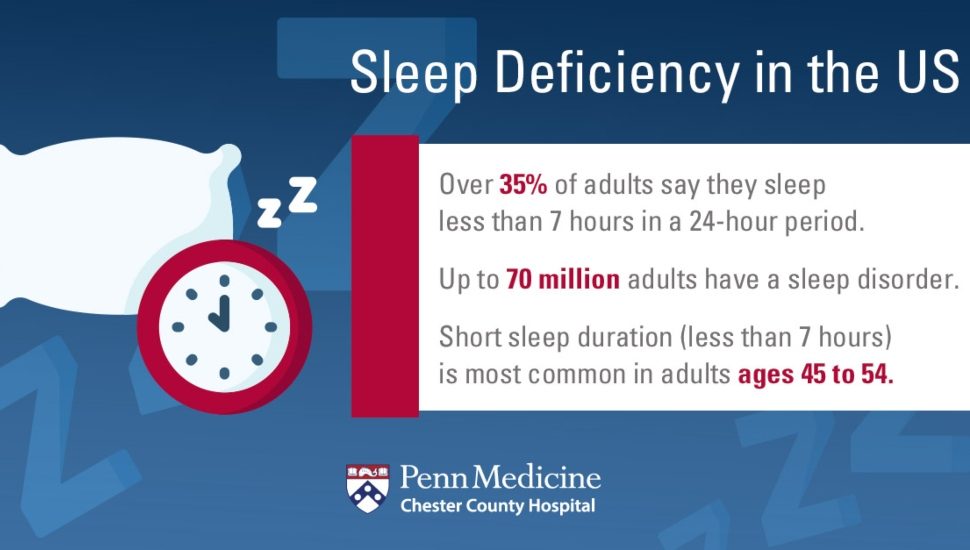Sleep Really Is the Best Medicine: Benefits of Sleep on Your Health


Waking up after a full night’s sleep can feel magical. You can think clearly, you’re full of energy, and you’re ready to take on the day.
But a night of minimal or no sleep can produce the opposite effect. You can feel groggy, exhausted, and not at all like yourself.
From March 8-14, it’s National Sleep Awareness Week — a time to recognize the importance of sleep in order to feel good and remain healthy.
While adults should get between seven to nine hours of shut-eye each night, many don’t. Sleep deprivation (when you don’t get enough sleep) and sleep deficiency (when you don’t sleep well) might be more common than you realize.
Getting enough sleep is crucial for your physical, mental, and emotional health. Here are five benefits of sleep on your health — and how to get enough if you’re not already.
1. Sleep lowers your risk for serious health problems.
When you sleep, your body gets to work — on healing, that is. As you slumber peacefully, your body heals your heart and blood vessels. But when you don’t sleep well, the opposite happens.
As a result, prolonged sleep deficiency has been connected with a higher risk of:
- Heart disease
- Kidney disease
- High blood pressure
- Stroke
- Mental Health Diseases
How much sleep you get also impacts how your body reacts to insulin — the hormone that controls your blood glucose (sugar) levels. Not getting enough sleep can lead to a higher blood sugar level, putting you at a greater risk of developing diabetes.
2. Sleep helps keep other illnesses and chronic pain at bay.
From the flu to the common cold to COVID-19, there’s a lot that your body needs to be protected from — and you can’t do it without sleep.
“Your immune system (the system that defends your body from foreign or harmful substances) requires sleep to function properly. If you don’t get enough, you may not be able to fight off common infections,” said Dr. Gaurav Patel, Pulmonary and Sleep Medicine Physician at Advanced Pulmonary & Sleep Associates, P.C.
What’s more, sleep deficiency can also cause a poorer response to vaccines. So whether your turn for the COVID-19 is already here or you’re patiently waiting, getting enough sleep can ensure your body is prepared.
Finally, sleep can help ease chronic pain. During a phase of sleep called non-rapid eye movement, blood flow to your muscles increases, allowing tissues to grow and repair. Not only does this help after a particularly tough workout, but it also helps reduce certain types of chronic pain.
3. Sleep helps you maintain a healthy weight.
Alongside a healthy diet and regular exercise, sleep reduces your chance of being overweight or obese. In fact, those who sleep fewer than seven hours each night are more likely to have a higher average body mass index (BMI) and become obese.
One reason for this is that sleep plays a role in your hormone levels. If you don’t get enough sleep, the hormones that make you hungry go up — and the ones that make you feel full go down. As a result, you’re less likely to aimlessly head to the pantry after a good night’s sleep.
4. Sleep improves your mood.
You probably know the feeling of being cranky after not getting enough sleep, and there’s a biological reason for that.
Sleep helps your brain work properly and get ready for the next day. Without adequate sleep, you may experience:
- Trouble controlling your emotions
- Difficulty coping with change
- Mood swings
- Anger
- Sadness or depression
- Anxiety
- Impulsiveness or risk-taking behavior
5. Sleep helps you avoid accidents and injury.
From working to making dinner to driving your car, everything you do throughout the day requires you to get enough sleep. Lacking sleep can lead you to make mistakes, have a slower reaction time, and put yourself in harm’s way.
For instance, drowsy driving can be just as dangerous as driving while intoxicated, with five times the risk for a fatal accident. Driver sleepiness is estimated to be a factor in about 100,000 car accidents — and 1,500 deaths — each year.
Depending on your profession, sleep deficiency can also put other people in danger. From healthcare workers to pilots to assembly line workers to commercial truck drivers, plenty of professions require your full attention — something that is difficult to do with little sleep.
Making Sure You Get Enough Zzz’s Each Night
If you’re regularly getting less than the recommended amount of sleep, it’s time to figure out why. Start with making room for enough sleep. Sleep is often the first thing to go in a busy schedule, but it’s important to prioritize sleep and your well-being.
Then, take steps to improve your quality of sleep by:
- Going to bed and waking up at the same time each day (even on weekends, when possible)
- Avoiding exercise and bright, artificial light an hour before bed
- Avoiding large meals and alcoholic drinks a few hours before bed
- Avoiding nicotine entirely
- Limiting caffeine to the morning hours
- Getting active every day
- Making sure your room is dark, quiet, and cool
If you’re still struggling to get enough quality sleep, talk to your healthcare provider. They can help you determine the cause of your sleeping trouble and provide you with suggestions. They can also test you for a sleep disorder, such as sleep apnea or restless leg syndrome, which are treatable.
Keep in mind — you can also get too much sleep, a disease called narcolepsy. Oversleeping has been associated with things like diabetes, obesity, and headaches. Read more about getting too much sleep from the National Sleep Foundation.
Sleep is an essential part of life. By getting enough sleep, you can ensure your body and mind are ready to take on the day well-rested and alert.
Do you have questions about how to get enough sleep or getting tested for a sleep disorder? Call 610-738-2300 to find a sleep medicine physician near you.
To learn more about Better Sleep for Better Health, join Dr. Patel on Thursday, March 11 for a virtual Wellness Presentation at 6 PM. Registration is required.
Connect With Your Community
Subscribe to stay informed!
"*" indicates required fields













![95000-1023_ACJ_BannerAd[1]](https://vista.today/wp-content/uploads/2023/03/95000-1023_ACJ_BannerAd1.jpg)


































